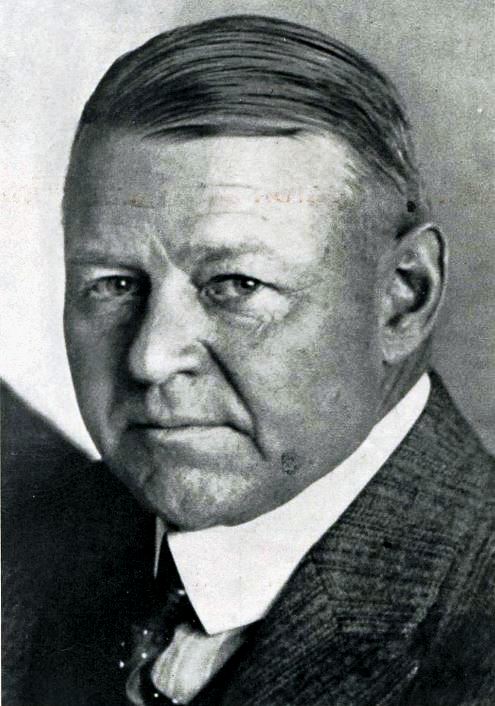
Samuel Hopkins Adams
Samuel Hopkins Adams (January 26, 1871 – November 16, 1958) was an American writer who was an investigative journalist and muckraker.
Samuel Hopkins Adams
January 26, 1871
November 16, 1958 (aged 87)
Author, journalist
- Muckraking journalism
- It Happened One Night
- The Gorgeous Hussy
- The Harvey Girls
- Elizabeth R. Noyes
- Jane Peyton Van Norman
Background[edit]
Adams was born in Dunkirk, New York. Adams was a muckraker, known for exposing public-health injustices. He was the son of Myron Adams, Jr., a minister, and Hester Rose Hopkins. Adams attended Hamilton College in Clinton, New York from 1887 to 1891. He also attended a semester at Union College. In 1907, Adams divorced his wife, Elizabeth Ruffner Noyes, after having two daughters. Eight years later Adams married an actress, Jane Peyton. Adams was a close friend of both the investigative reporter Ray Stannard Baker and District Attorney Benjamin Darrow.[1]
Literary works[edit]
Adams was a prolific writer, who wrote fiction as well. “Night Bus” (1933), one of Adams’s many magazine stories, became the basis for the 1934 film ‘’It Happened One Night‘’. Adams’s first solo novel was in 1908, ‘’Flying Death’’, which added to his mystery collection.[1] His best-known novel, ‘’Revelry’’ (1926), based on the scandals of the Harding administration, was later followed by ‘’Incredible Era’’ (1939), a biography of Harding.
Among his other works are ‘’The Great American Fraud’’ in ‘’Collier's‘’ (1905–06), ‘’The Mystery’’ (1907), with S. E. White, ‘’Average Jones’’ (1911), ‘’The Secret of Lonesome Cove’’ (1912), ‘’The Health Master’’ (1913), ‘’The Clarion’’ (1914), ‘’The Unspeakable Perk’’ (1916), ‘’Our Square and the People in It’’ (1917), ‘’Success’’ (1921), ‘’Siege’’ (1924), ‘’The Gorgeous Hussy’’ (1934), ‘’Maiden Effort’’ (1937), ‘’The Harvey Girls‘’ (1942; adapted into the 1946 movie musical starring Judy Garland), ‘’Canal Town’’ (1944), ‘’Plunder’’ (1948), ‘’Grandfather Stories‘’ (1955), and
m. ‘’Average Jones’’ is a series of stories about a detective investigating fraudulent or unusual advertisements.
In addition to his many books, Adams also wrote 415 short stories and articles.[1]
‘’Tenderloin’’ described the battle between Charles H. Parkhurst and Tammany Hall. ‘’The New York Times‘’ reviewer H. I. Brock called the book an “outstanding period piece” and “a finale to a long and varied writing career”. ‘’Tenderloin’’ was adapted into a 1960 musical with book by George Abbott and Jerome Weidman and songs by Jerry Bock and Sheldon Harnick, the team that had created ‘’Fiorello!‘’ ‘’Tenderloin’’ ran for 216 performances. New critic Howard Taubman praised the songs, but complained about a “dragging book” and said, “The wages of virtue, alas, are largely dullness.”
Adams also published a biography of Alexander Woollcott (1945) and three books for the Landmark Series, ‘’The Pony Express’’ (1950), ‘’The Santa Fe Trail’’ (1952), and ‘’The Erie Canal’’ (1953).
The printing of his 1947 novel ‘’Banner by the Wayside’’ was the subject of an ‘’Encyclopædia Britannica’’ documentary on the manufacture of hardback books (see external links). Adams last book, ‘’Tenderloin’’ (1959), was published after his death and was later adapted into a Broadway musical.
In the 1920s and 1930s, Adams, under the pseudonym of Warner Fabian, wrote several novels that at the time were considered highly risqué. These titillating works, which mainly featured young women flappers and their trials and tribulations of early adulthood, often became best-sellers avidly read by Jazz Age youth. Flaming Youth, Adams' first novel of this sort, dealt with the sexual urges of young women and had a sexual frankness that was shocking for its time. Because of the nature of the novels, Adams utilized the Fabian pseudonym so that his more standard works would not be tainted by any scandal accruing to these novels. Most of these novels were later brought to the screen, including Flaming Youth starring Colleen Moore; Sailors' Wives, with Mary Astor in the lead; and The Wild Party featuring Clara Bow.
Novels published under the pseudonym "Warner Fabian" include:
Later life and death[edit]
Adams had a winter residence in Beaufort, South Carolina. He died in Beaufort on November 16, 1958, at the age of 87.[1]
He was cremated and his ashes were scattered at his home at Owasco Lake in New York State.[4]
Adams's papers are archived in academic libraries, including Syracuse University, Hamilton College, and Harvard University. A significant portion of his collections are located at the American Antiquarian Society in Worcester, Massachusetts.